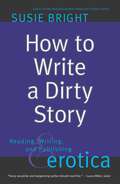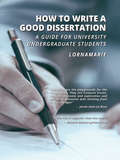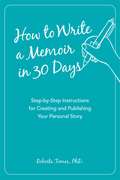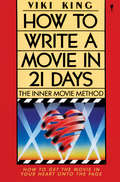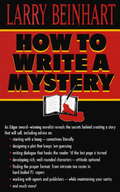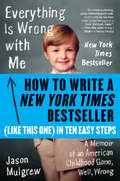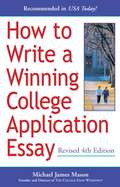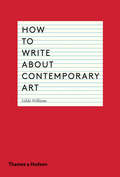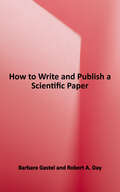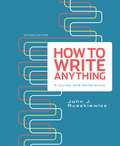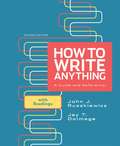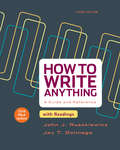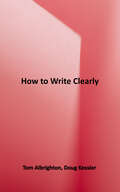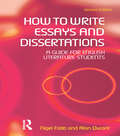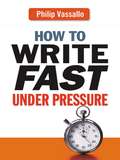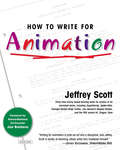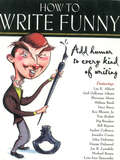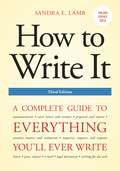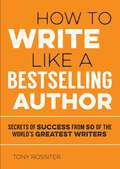- Table View
- List View
How to Write a Dirty Story: Reading, Writing, and Publishing Erotica
by Susie BrightFor aspiring erotica writers -- and authors in any genre who want to make the "good" parts great Susie Bright is the first and reigning queen of contemporary erotica. In How to Write a Dirty Story she reveals her tricks of the trade and shows you how to heat up sex scenes in everything from traditional novels and romances to science fiction and humor. Easing the aspiring writer into the creative process, she tells you how to write the steamy plots and sensual characters that publishers and readers are looking for. Bright makes it easy to: Produce unique ideas * Master erotic language Climax the story * Sell your work to the right place Each chapter features practical writing exercises and suggestions for nonwriting activities that will galvanize the imagination and raze any creative or psychological hurdle. When it's time to go public, Bright draws on her own writing and publishing experiences and explains the most effective ways to find an agent, work with an editor, and grow a loyal audience. As irreverent as it is practical, How to Write a Dirty Story is the only book an erotica author -- novice or seasoned -- needs.
How to Write a Good Dissertation A guide for University Undergraduate Students
by LornaMarieHow to Write a Good Dissertation - A Guide for University Undergraduate Students is an essential reference guide for university undergraduate student and anyone who wishes to write at professional level. Every undergraduate student will at some point be required to write a dissertation, project, a portfolio or thesis. This could be daunting and having gone through that experience myself, I thought a book like this would be helpful to students around the world. I have tried to keep it concise, succinct, and as brief as much as possible; the last thing a student need is reading a lengthy guide on how to write their onerous project. Most of the chapters cover topics every student will find useful regardless of their course of study. This book covers essential policies, guidelines and procedures set out in the code of practice for writing projects in most reputable universities around the world. The author covered essential topics that every student must have at their fingertips such as choosing a research topic, using the library and using database for searches, copyright, editing, gathering and collating information, citing references, code of practice in research, evidence-based approach, confidentiality, privacy and data protection, and virtual learning environment. Formatting, editing, binding and finishing your project are all succinctly explained in simple English language in this book.
How to Write a Historic Structure Report
by David ArbogastA one-of-a-kind, step-by-step guide to compiling an HSR--a document crucial to every professional working on a historic property. Any architect, engineer, or preservation professional renovating a historic property must be familiar with the historic structure report (HSR)--a document that evaluates all aspects of a property to minimize damage during restoration. The only book of its kind, this practical guide walks readers through the process of compiling an HSR. From gathering historical and archival data about the property to analyzing its structural, mechanical, and electrical components to assessing the state of its interior finish, including wood, masonry, and metals, this book covers all the nuts and bolts of an expertly written, informative HSR. Explaining what information should be included in each section and how investigators can work together effectively as a team to produce a comprehensive, coherent report, this handbook is one no professional should be without.
How to Write a Letter: Find the Words for Every Occasion (How To Series)
by Chelsea Shukov Jamie GrobeckerThe go-to resource for creative ideas and helpful tips for writing thank you notes, addressing envelopes, cover letters, and everything in between, from the creators of Sugar PaperFeeling like sending a little love in the mail but not sure how to get started? Along with letter-writing golden rules, How to Write a Letter will make it easier to:• select the perfect stationery for any occasion • find the best salutation and sign off• choose the right words for any situation, from congratulations to condolences• properly address an envelope in styleWith this book, you&’ll discover how hand-writing your thoughts and feelings has the magic to turn a card, letter, or even scrap of paper into a treasure.
How to Write a Memoir in 30 Days
by Roberta TemesHow to Write Your Memoir in 30 Days provides the framework for writers enthusiastic about telling their story, but wondering how to begin. Step-by-step techniques, culled from writers' workshops taught by the author, are presented in a welcoming, non-intimidating style. The prospect of writing a book is not daunting when compartmentalized into thirty discrete assignments: Days 1 - 5 include exercises to identify major themes. Days 6 - 10 include exercises about plot. Days 11 - 15 include exercises about personalities. Days 16 - 20 include exercises about experiences. Days 21 - 25 include exercises that analyze responses to events. Days 26 - 30 include exercises that structure the story of the memoir. The book also includes information about publishers and literary agents, as well as information and resources about self-publishing. It also includes quick "clear communication" lessons about spelling and grammar. Perfect for today's society, where we are all accustomed to celebrating each of life's passages with a blog post and comfortable sharing our innermost feelings, How to Write a Memoir in 30 Days is a fun, easy guide to writing the next great memoir.
How to Write a Movie in 21 Days: The Inner Movie Method
by Viki KingThe ultimate survival guide, How to Write a Movie in 21 Days takes the aspiring screenwriter the shortest distance from blank page to complete script.Viki King's Inner Movie Method is a specific step-by-step process designed to get the story in the writer's onto the page. This method guides the would-be screenwriter through the writing of a movie. It answers such questions as: How to clarify the idea you don't quite have yet How to tell if your idea is really a movie How to move from what you want to say saying it How to stop getting ready and startOnce you know what to write, the Inner Movie Method will show you how to write it. It also addresses such issues as: How to pay the rent while paying your dues What to say to your spouse when you can't come to bed How to keep going when you think you can'tFor accomplished screenwriters honing their craft, as well as those who never before brought their ideas to paper, How to Write a Movie in 21 Days is an indispensable guide. And Viki King's upbeat, friendly style is like having a first-rate writing partner every step of the way.
How to Write a Mystery
by Larry BeinhartWHODUNIT? YOUDUNIT!So you want to write a mystery. There's more to it than just a detective, a dead body, and Colonel Mustard in the drawing room with the candlestick. Fortunately, Larry Beinhart--Edgar Award-winning author of You Get What You Pay For, Foreign Exchange, and American Hero--has taken a break from writing smart, suspenseful thrillers to act as your guide through all the twists and turns of creating the twists and turns of a good mystery. Drawing on advice and examples from a host of the best names in mystery writing--from Raymond Chandler and Mickey Spillane to Scott Turow and Thomas Harris--plus some of his own prime plots, Larry Beinhart introduces you to your most indispensable partners in crime: *Character, plot, and procedure * The secrets to creating heroes, heroines, and villains ("All writers draw upon themselves and their experience. While the whole of yourself might not be capable of being either a serial killer or an FBI agent, there are parts in each of us that are capable of almost anything.") * The fine art of scripting the sex scene *The low-down on violence ("A crime novel without violence is like smoking pot without inhaling, sex without orgasm, or a hug without a squeeze." ) *And much more!From the opening hook to the final denouement, Larry Beinhart takes the mystery out of being a mystery writer.From the Trade Paperback edition.
How to Write a New York Times Bestseller in Ten Easy Steps (eBook Original)
by Jason MulgrewDownload, for free!, a hilarious essay by New York Times bestselling author Jason Mulgrew, plus get a sneak peek from his new book, 236 Pounds of Class Vice President, available February 12, 2013. For a few "glorious" weeks, Jason Mulgrew's first book, Everything Is Wrong with Me, appeared on the New York Times bestseller list, before dropping off and returning to the deep obscurity to which it belongs. Jason Mulgrew has not been able to shut up about it since and now believes that he is qualified to write the following primer, "How to Write a New York Times Bestseller in Ten Easy Steps." Please accept our apologies in advance.
How to Write a Thesis (The\mit Press Ser.)
by Umberto EcoUmberto Eco's wise and witty guide to researching and writing a thesis, published in English for the first time. By the time Umberto Eco published his best-selling novel The Name of the Rose, he was one of Italy's most celebrated intellectuals, a distinguished academic and the author of influential works on semiotics. Some years before that, in 1977, Eco published a little book for his students, How to Write a Thesis, in which he offered useful advice on all the steps involved in researching and writing a thesis—from choosing a topic to organizing a work schedule to writing the final draft. Now in its twenty-third edition in Italy and translated into seventeen languages, How to Write a Thesis has become a classic. Remarkably, this is its first, long overdue publication in English. Eco's approach is anything but dry and academic. He not only offers practical advice but also considers larger questions about the value of the thesis-writing exercise. How to Write a Thesis is unlike any other writing manual. It reads like a novel. It is opinionated. It is frequently irreverent, sometimes polemical, and often hilarious. Eco advises students how to avoid “thesis neurosis” and he answers the important question “Must You Read Books?” He reminds students “You are not Proust” and “Write everything that comes into your head, but only in the first draft.” Of course, there was no Internet in 1977, but Eco's index card research system offers important lessons about critical thinking and information curating for students of today who may be burdened by Big Data.How to Write a Thesis belongs on the bookshelves of students, teachers, writers, and Eco fans everywhere. Already a classic, it would fit nicely between two other classics: Strunk and White and The Name of the Rose.ContentsThe Definition and Purpose of a Thesis • Choosing the Topic • Conducting Research • The Work Plan and the Index Cards • Writing the Thesis • The Final Draft
How to Write a Thesis
by Francesco Erspamer Geoff Farina Umberto Eco Caterina Mongiat FarinaBy the time Umberto Eco published his best-selling novel The Name of the Rose, he was one of Italy's most celebrated intellectuals, a distinguished academic and the author of influential works on semiotics. Some years before that, in 1977, Eco published a little book for his students, How to Write a Thesis, in which he offered useful advice on all the steps involved in researching and writing a thesis -- from choosing a topic to organizing a work schedule to writing the final draft. Now in its twenty-third edition in Italy and translated into seventeen languages, How to Write a Thesis has become a classic. Remarkably, this is its first, long overdue publication in English. Eco's approach is anything but dry and academic. He not only offers practical advice but also considers larger questions about the value of the thesis-writing exercise. How to Write a Thesis is unlike any other writing manual. It reads like a novel. It is opinionated. It is frequently irreverent, sometimes polemical, and often hilarious. Eco advises students how to avoid "thesis neurosis" and he answers the important question "Must You Read Books?" He reminds students "You are not Proust" and "Write everything that comes into your head, but only in the first draft." Of course, there was no Internet in 1977, but Eco's index card research system offers important lessons about critical thinking and information curating for students of today who may be burdened by Big Data.How to Write a Thesis belongs on the bookshelves of students, teachers, writers, and Eco fans everywhere. Already a classic, it would fit nicely between two other classics: Strunk and White and The Name of the Rose.This MIT Press edition will be available in three different cover colors.ContentsThe Definition and Purpose of a ThesisChoosing the TopicConducting ResearchThe Work Plan and the Index CardsWriting the ThesisThe Final Draft
How to Write a Winning College Application Essay, Revised 4th Edition: Revised 4th Edition
by Michael James MasonGet into the College of Your DreamsAn original and creative essay is one of the keys to getting into the college you've always dreamed of, as well as to getting the financial aid you deserve. This book gives you everything you need to make your own unique talents shine in your college application essay. Even if writing is not your strong point, author Michael James Mason shows you:·Exactly what admissions officers look for ·What works--and what doesn't, using actual student essays ·Proven techniques for writing your best essay ·Special tips for SAT and scholarship essays ·A last-minute checklist before you submit your essay ·And much more!"Well written, very useful, and highly recommended." --Hunter's Guide to the College Guides"Demystifies one of the most important and challenging parts of the college application process--the personal essay. . . . An invaluable resource!" --Gail Devine, director of college counseling, Louisville High School, Woodland Hills, California"This book taught me what colleges look for in an essay and showed me how to effectively communicate my thoughts in writing." --Ryan Miller, University of Virginia graduateFrom the Trade Paperback edition.
How to Write About Contemporary Art
by Gilda WilliamsAn essential handbook for students and professionals on writing eloquently, accurately, and originally about contemporary art How to Write About Contemporary Art is the definitive guide to writing engagingly about the art of our time. Invaluable for students, arts professionals and other aspiring writers, the book first navigates readers through the key elements of style and content, from the aims and structure of a piece to its tone and language. Brimming with practical tips that range across the complete spectrum of art-writing, the second part of the book is organized around its specific forms, including academic essays; press releases and news articles; texts for auction and exhibition catalogues, gallery guides and wall labels; op-ed journalism and exhibition reviews; and writing for websites and blogs. In counseling the reader against common pitfalls--such as jargon and poor structure--Gilda Williams points instead to the power of close looking and research, showing how to deploy language effectively; how to develop new ideas; and how to construct compelling texts. More than 30 illustrations throughout support closely analysed case studies of the best writing, in Source Texts by 64 authors, including Claire Bishop, Thomas Crow, T.J. Demos, Okwui Enwezor, Dave Hickey, John Kelsey, Chris Kraus, Rosalind Krauss, Stuart Morgan, Hito Steyerl, and Adam Szymczyk. Supplemented by a general bibliography, advice on the use and misuse of grammar, and tips on how to construct your own contemporary art library, How to Write About Contemporary Art is the essential handbook for all those interested in communicating about the art of today.
How to Write and Publish a Scientific Paper
by Barbara Gastel Robert A. DayNow thoroughly updated and expanded, this new edition of a classic guide offers practical advice on preparing and publishing journal articles as well as succeeding in other communication-related aspects of a scientific career. <p><p> Writing and publishing journal articles are essential aspects of a successful scientific career. Unfortunately, many scientists find the process of communicating about their work intimidating and confusing. Now in its eighth edition, How to Write and Publish a Scientific Paper teaches how to apply clear focus, good organization, and simple, straightforward language to write papers as well as communicate effectively in many other scientifically related applications. <p><p> By providing practical, readable, and sometimes humorous guidance, this book enables researchers to gain the knowledge, skills, and confidence to succeed in communicating about their work. The authors not only guide readers in the craft of scientific writing―broken down into the separate tasks of writing the respective sections of a scientific paper and then publishing the paper―but also address important related psychological, ethical, logistical, and cultural considerations in communicating about science. <p><p> Chapter topics include composing (and requesting) recommendation letters, writing grant proposals, providing peer review, editing one's own work, preparing oral presentations and poster presentations, and working with the popular media. This is an essential resource for researchers―both native and non-native users of English―with limited experience writing scientific papers, such as graduate students, postdoctoral fellows, and early-career faculty members.
How to Write Anything: A Guide and Reference (Second Edition)
by John J. RuszkiewiczDesigned to be clear and simple, How to Write Anything combines the thoughtfulness of rhetorics with the efficiency of brief handbooks. Through memorable visuals and honest talk, John Ruszkiewicz shows students how to write in any situation -- wherever they are in their writing process. With everything you need to teach composition, the Guide lays out focused advice for writing common genres, while the Reference covers the range of writing and research skills that students need as they work across genres and disciplines. An intuitive, visual cross-referencing system and a modular chapter organization that' s simple to follow make it even easier for students to work back and forth between chapters and stay focused on their own writing.
How To Write Anything: A Guide and Reference with Readings
by John J. Ruszkiewicz Jay T. DolmageHow to Write Anything supports students wherever they are in their writing process. Designed to be clear and simple, the Guide lays out focused advice for writing common academic and real-world genres, while the Reference covers the range of writing skills that students needs as they work across genres and disciplines. Genre-based readings -- including narratives, reports, arguments, evaluations, proposals and rhetorical, causal, and literary analyses -- are sure to engage students and inspire ideas. The result is everything you need to teach composition in a flexible, highly visual guide, reference and reader. This new edition gives students more support for academic writing, more help choosing and working with genres, and more emphasis on multimodal composing.
How To Write Anything with Readings with 2016 MLA Update
by Jay T. Dolmage John J. RuszkiewiczTHIS TITLE HAS BEEN UPDATED TO REFLECT THE 2016 MLA UPDATES! Our editorial team has updated this text based on content from The MLA Handbook, 8th Edition. Browse our catalog or contact your representative for a full listing of updated titles and packages, or to request a custom ISBN. Instructors at hundreds of colleges and universities have turned to How to Write Anything for clear, focused writing advice that gives students just what they need, when they need it. And students love it—because John Ruszkiewicz’s tone makes writing in any genre approachable, with a flexible, rhetorical framework for a range of common academic and real-world genres, and a reference with extra support for writing, research, design, style, and grammar. The new edition also gives students more support for writing portfolios, more help working with the concept of genre, and more emphasis on critical reading and writing—all essential to academic success. And you’ll find more teaching ideas and syllabi from the community of teachers led by coauthor Jay Dolmage. The result is everything you need to teach composition in a flexible and highly visual guide, reference, and reader.
How to Write Clearly: Write with purpose, reach your reader and make your meaning crystal clear
by Tom AlbrightonWhatever you're writing, you have to make it clear. You could be writing a website, a brochure, or a client presentation. You could be preparing a job application, an email, or a classified ad. Or you might be writing an article or a book. Whatever it is, the clearer you make it, the better your results will be. How to Write Clearly will help. It's an authoritative yet easy-to-read guide that will make your non-fiction writing more colourful, expressive, and precise. Writing is more than just words on a page. It's a process of communication. That's why How to Write Clearly draws on cutting-edge ideas from psychology, education, and linguistics to look deep into the reader's mind and explore the 'why' as well as the 'how' of writing techniques. It's ideal for marketers, businesspeople, journalists, educators, and anyone who needs to communicate with the written word. You'll learn: - How to understand your reader and tune into what they need - How to use plain language to make your writing accessible, readable and relatable - Ten treacherous traps you must avoid - Proven techniques for explaining new ideas - How to captivate your reader with storytelling, humour, intrigue, perspective and more - What changes readers' minds - How to craft clear sentences and paragraphs - Using empathy and pacing to put the reader at their ease - How to choose the right structure, length and title - Pages of pro tips for drafting, editing and using feedback. Fully illustrated and referenced, with a wealth of examples throughout, this book is the definitive guide to non-fiction writing today.
How to Write Essays and Dissertations: A Guide for English Literature Students
by Alan Durant Nigel FabbThe first book that literature students should read, this guide reveals the distinct set of skills, conventions and methods of essay and dissertation writing.Taking students through the various stages of writing, from planning to final submission, it offers specific guidelines and a lively, detailed commentary on actual examples of student work at each stage.
How to Write Fast Under Pressure
by Philip VassalloVassallo has 25 years of experience teaching writing in corporate, academic, and government environments. Here, he offers a combination of practical techniques and inspiration for writing on deadline in all sorts of work-related situations and environments, employing the characters Speedy Didi and Mopey Moe to demonstrate effective and ineffective techniques and attitudes. He offers seven idea generators to jumpstart the writing process, then suggests an attitude that prizes volume and momentum over perfection during the writing process itself. He also gives advice on controlling the writing environment, describes habits of productive writers, and provides five-, ten-, and 20-minute fixes for improving a document, illustrated with case studies and examples. The final section has suggestions for maintaining writing productivity, prioritizing work, and preventing emergencies. Annotation c2010 Book News, Inc. , Portland, OR (booknews. com)
How to Write for Animation
by Jeffrey ScottHow to Write for Animation is the ultimate guide for anyone with ambitions of writing for the most rapidly developing medium in all of entertainment. In recent years, the world of animation has expanded far beyond the Saturday morning cartoons that generations of Americans grew up watching. Recent years have seen a boom in animation—hit prime-time television series, blockbuster cutting-edge digitally animated features, conventional animation. The expanding market is luring writers who have an eye toward the future and an eagerness to work in a medium where the only limit is the depth on one’s imagination. With step-by-step instructions and the insights of a seasoned veteran, award-winning animation writer Jeffrey Scott details the process of developing even the vaguest of ideas into a fully realized animation script. He details every stop on the road from inspiration to presentation, with sections on premises, outlines, treatments, description, and dialogue, and much more.
How to Write for Animation
by Jeffrey ScottHow to Write for Animation is the ultimate guide for anyone with ambitions of writing for the most rapidly developing medium in all of entertainment. In recent years, the world of animation has expanded far beyond the Saturday morning cartoons that generations of Americans grew up watching. Recent years have seen a boom in animation--hit prime-time television series, blockbuster cutting-edge digitally animated features, conventional animation. The expanding market is luring writers who have an eye toward the future and an eagerness to work in a medium where the only limit is the depth on one's imagination. With step-by-step instructions and the insights of a seasoned veteran, award-winning animation writer Jeffrey Scott details the process of developing even the vaguest of ideas into a fully realized animation script. He details every stop on the road from inspiration to presentation, with sections on premises, outlines, treatments, description, and dialogue, and much more.
How to Write for Animation
by Jeffrey ScottIn recent years, the world of animation has expanded rapidly, and the market is luring writers who have an eye on the future and an eagerness to work in a medium where the only limitis the depth of one's imagination. With step-by-step instructions and the insights of a seasoned veteran, award-winning animation writer Jeffrey Scott details the process of developing even the vaguest of ideas into a fully realised animation script. He details every stop on the road from inspiration to presentation with sections on premises, outlines, dialogue and more.
How to Write Funny: Add Humor to Every Kind of Writing
by John B. KachubaWriting humor is subjective and challenging; thankfully, there are many ways to create it. How to Write Funny provides advice, insights and humor from more than twenty writers with a gift for making readers laugh.
How to Write It, Third Edition: A Complete Guide to Everything You'll Ever Write
by Sandra E. LambWrite personal and professional communications with clarity, confidence, and style. How to Write It is the essential resource for eloquent personal and professional self-expression. Award-winning journalist Sandra E. Lamb transforms even reluctant scribblers into articulate wordsmiths by providing compelling examples of nearly every type and form of written communication. Completely updated and expanded, the new third edition offers hundreds of handy word, phrase, and sentence lists, precisely crafted sample paragraphs, and professionally designed document layouts. How to Write It is a must-own for students, teachers, authors, journalists, bloggers, managers, and anyone who doesn't have time to wade through a massive style guide but needs a friendly desk reference.From the Trade Paperback edition.
How to Write Like a Bestselling Author: Secrets of Success from 50 of the World's Greatest Writers
by Tony RossiterIlluminating the best-known works of 50 celebrated authors, writing coach Tony Rossiter shows you how they achieved their phenomenal success. He explains how each author began writing, and examines their style, techniques and routine for creative insights. If you want to write a bestseller, this guide will set you on the path to success.
